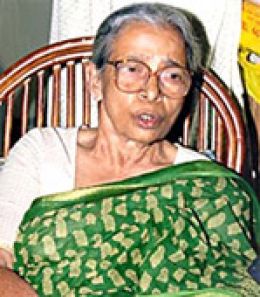 On Wednesday (18th March), fourteen authors across the world were been named as the contenders for the Man Booker International prize. The long list of writers includes the name of prolific veteran Bengali writer Mahasweta Devi. Sir V. S. Naipaul is also included in the list. In all 14 authors from 12 countries have been nominated for Booker Prize, which is one of the most prestigious literary awards in the world. The prize given in two years carries prize money of 60,000 pounds and can be won by any author worldwide, provided their work is available in English.
On Wednesday (18th March), fourteen authors across the world were been named as the contenders for the Man Booker International prize. The long list of writers includes the name of prolific veteran Bengali writer Mahasweta Devi. Sir V. S. Naipaul is also included in the list. In all 14 authors from 12 countries have been nominated for Booker Prize, which is one of the most prestigious literary awards in the world. The prize given in two years carries prize money of 60,000 pounds and can be won by any author worldwide, provided their work is available in English.
Continue reading
Category Archives: Generic
Jaynagarer Moa to be Patented
 The famous Joynagar moa, a confectionery prepared from date palm jaggery (nalen gur) and puffed, rice could be given a geographical indication (GI) patent. If awarded, the patent would be the second for a produce of Bengal, after Darjeeling tea. Also in the pipeline for a GI patent are Bardhamaner Sithabhog, Shaktigarer lyangcha and Mursidabad silk. Continue reading
The famous Joynagar moa, a confectionery prepared from date palm jaggery (nalen gur) and puffed, rice could be given a geographical indication (GI) patent. If awarded, the patent would be the second for a produce of Bengal, after Darjeeling tea. Also in the pipeline for a GI patent are Bardhamaner Sithabhog, Shaktigarer lyangcha and Mursidabad silk. Continue reading
Skype Beware! Google Voice is Coming!
Google has announced a new service, Google Voice. In 2007 Google acquired GrandCentral, a phone management service, for $50+ million. Since then GrandCentral was almost forgotten. Now Google unveils the GrandCentral service as voice call service that can give Skype a run for their money. With Google Voice, a subscriber can have a single phone number and any call made to that number will be forwarded to all your phones – home, cell, office or your hotel room. Calls using Google Voice is free within USA. International calls will cost around 2 cents a minute. The other features include sending, receiving and storing text messages, listen-in feature to listen to calls before taking it, voice mail and voice mail transcript service that allows storing and archiving of voice mail messages as text and many other features.
Currently Google Voice service is available only to existing GrandCentral customers. But as soon as it does open its doors, it will surely cause a major dent to Skype and other similar services. Let’s just wait and see how it rolls out.
“Origins of the Financial Crisis” and Other Lessons
While the current economic crisis still bogging us down to our knees, I chanced upon an insightful lecture by Dr. Alan Blinder, a Professor of Economics and Public Affairs at the Woodrow Wilson School, Princeton University. A world renowned economist, Prof. Blinder speaks very eloquently about the multiple causes and culprits of the current economic crisis and also spells out the possible remedies. It was an extremely educational experience for me, and I think will be the same for many people like me who keep on hearing multiple different stories from different sources. Continue reading
Slumdogs, Oscars, and Artists
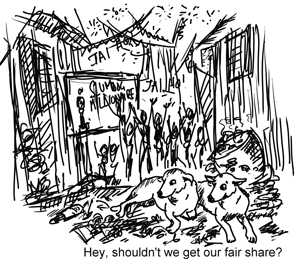 The recent success of “Slumdog Millionaire” at the Oscars have resurfaced a new crisis that has often plagued us, the people of India and Indian origin. Well, I should possibly qualify that statement by saying that not everybody is complaining. In fact the slum dwellers are celebrating the Oscar win as their won victory. It is only those people who feel insecure of their reality has been complaining the most by accusing that these artists and film makers are making millions by exploiting the poverty of India. Many have been offended by the film’s title “Slumdog” as a derogatory comment on the slum dwellers. Some have even moved to the court and demanded that the film be re-titled. Some have been organizing protest rallies and meetings to awaken the masses against the western exploitation of our poverty. Continue reading
The recent success of “Slumdog Millionaire” at the Oscars have resurfaced a new crisis that has often plagued us, the people of India and Indian origin. Well, I should possibly qualify that statement by saying that not everybody is complaining. In fact the slum dwellers are celebrating the Oscar win as their won victory. It is only those people who feel insecure of their reality has been complaining the most by accusing that these artists and film makers are making millions by exploiting the poverty of India. Many have been offended by the film’s title “Slumdog” as a derogatory comment on the slum dwellers. Some have even moved to the court and demanded that the film be re-titled. Some have been organizing protest rallies and meetings to awaken the masses against the western exploitation of our poverty. Continue reading
Cartoon of the Week 16: Healthcare Costs
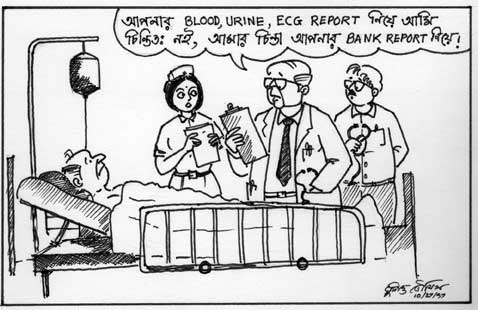
I drew this cartoon long time ago to highlight the healthcare cost crisis. For the benefit of the readers who don’t read Bengali let me explain it a bit. The doctor looking at his patient’s charts comments that he is not concerned with his lab reports but he is concerned about his bank statement reports which of course is not good enough to bear the cost of treatment.
Healthcare cost management, one of the major election issues last year, is once again in the back burner – being overshadowed by the economic meltdown. Although the recent economic stimulus package contains a provision to modernize health-care record keeping which can potentially reduce some of the costs and also provide for some computer programming jobs, it can hardly put a dent on this monstrous problem. Health-care cost is poised to be the next bubble to burst and it can also have devastating effects on the population and businesses. This needs to be dealt with as soon as possible before the entire system disintegrates. Many hospitals are reporting higher rates of ER admissions for patients without insurance. This is expected with the high unemployment numbers. Soon the hospitals will be asking for bail out money. Continue reading
“Jadio Galpo”: Globalization in Bengali Theatre
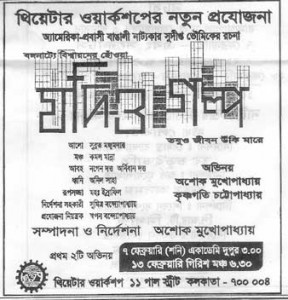 Theatre Workshop, the leading theater company/group of Kolakata, will be premiering their new production “Jadio Galpo” at the Academy of Fine Arts theater in Kolkata at 3.00pm on Saturday February 7th. The play is written by yours truly and was earlier produced by our group ECTA in Kolkata and USA as “Satyameva”. The play has also been published in the Bohurupi theater magazine in 2008.
Theatre Workshop, the leading theater company/group of Kolakata, will be premiering their new production “Jadio Galpo” at the Academy of Fine Arts theater in Kolkata at 3.00pm on Saturday February 7th. The play is written by yours truly and was earlier produced by our group ECTA in Kolkata and USA as “Satyameva”. The play has also been published in the Bohurupi theater magazine in 2008.
Theater Workshop, who under the leadership of Ashok Mukhopadhyay, is promoting the play as the first attempt in globalizing Bengali Theater. Globalization has affected Bengali theater from its early days with the contributions of Herasim Steppanovich Lebedeff and later with the numerous adaptations of western plays onto Bengali stage. But the play “Jadio Galpo” introduces globalization from a different perspective – it deals with the lives of the global Bengali. Bengalis are no longer limited within the geographic confines of the two Bengals, they have now spread themselves out all over the world. And, it is rare to see a play these days that talks about the lives of the Bengalis who live outside Bengal or Bangladesh. There has been some attempts in films (Bong Connection, The Namesake etc.) but Bengali theater has always kept themselves limited to their roots. In 2006, when our group staged “Ron” in Kolkata, it created quite a bit of stir. Ananda Lal, the theater reviewer of “The Telegraph” wrote in 2007 while writing about “Satyameva” – “The group from New Jersey who last year stunned Calcutta with their play Ron…”. And I believe that this effect was caused not by any production extravaganza, but due to the fact that possibly for the first time the Kolkata audience experienced a Bengali play that takes place in an American locale, a play that tells the stories of Bengalis in America.
“Jadio Galpo” also tells the stories of two generations of Bengalis in America – the veterans who struggled hard to reach their pinnacle of success, and the new comers or FOBs (Fresh Off the Boat) who with their H1-B visa are set to conquer the world by any means. But it also talks about hopes and dreams – dreams fulfilled and dreams shattered. The tales of the global Bengali also needs to be told – also needs to be listened too. Because it is only from a distance can one see one’s own world in a different light.
The upcoming show schedules are as follows:
Feb 7th, 3.00pm Academy of Fine Arts, Kolkata
Feb 13th, 6.30pm Girish Mancha, Kolkata
Other shows will be advertised in the local newspapers.
The play is directed by Ashok Mukhopadhyay who also acts in one of the lead roles. The other character is performed by Krishnagoti Chatterjee.
If you happen to be in Kolkata, I’d strongly encourage you to watch the play and give me your feedback.
Thank you.
Cartoon of the Week 15: Train Travel
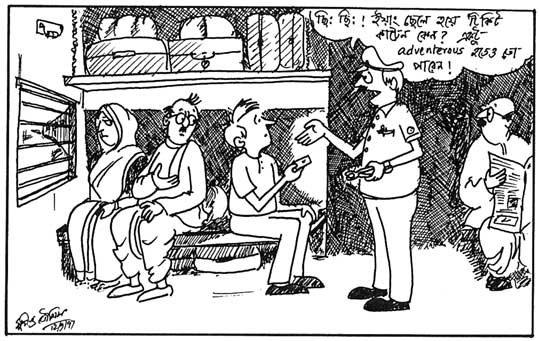 Traveling long distance by train was one of the most enjoyable modes of transportation in India. Once you get over the initial hurdles of getting a reserved seat or squeeze yourself in through the crowded doors as the train slowly rolls in to the platform or the frantic attempts to manage the porter and the family, the journey becomes much easy and enjoyable. Overnight train rides are especially thrilling when you not only need to manage a berth to sleep, but also keep an eye on your luggage and belongings to protect them from the “highly suspicious” co-passengers around you. When I was a child, I remember the train journeys from Kolkata (Sealdah or Howrah depending on which train you take) to Siliguri. Before the Farrakka bridge (barrage) was completed, we had to get off the train at Farakka and then take a steam boat across the Ganges to the other side (Sagrikoli Ghaat) and then scramble on to the train after a long run. If you were unlucky enough of not having a proper reservation, then your plight can only be imagined by those who took that journey. However, once you are settled in your seats or berths, temptations start knocking on your senses as the aroma of hot food attracts your attention along with the loud marketing attempts by the food vendors on the station. The appetizing offerings of “Ilish Maachher Jhol”, “Bhaaja Mooger Daal”, “Gorom Bhaat with Ghee” and “Begun Bhaja” pulls in many hungry passengers to the bamboo and hay thatched eateries all around the train station. Continue reading
Traveling long distance by train was one of the most enjoyable modes of transportation in India. Once you get over the initial hurdles of getting a reserved seat or squeeze yourself in through the crowded doors as the train slowly rolls in to the platform or the frantic attempts to manage the porter and the family, the journey becomes much easy and enjoyable. Overnight train rides are especially thrilling when you not only need to manage a berth to sleep, but also keep an eye on your luggage and belongings to protect them from the “highly suspicious” co-passengers around you. When I was a child, I remember the train journeys from Kolkata (Sealdah or Howrah depending on which train you take) to Siliguri. Before the Farrakka bridge (barrage) was completed, we had to get off the train at Farakka and then take a steam boat across the Ganges to the other side (Sagrikoli Ghaat) and then scramble on to the train after a long run. If you were unlucky enough of not having a proper reservation, then your plight can only be imagined by those who took that journey. However, once you are settled in your seats or berths, temptations start knocking on your senses as the aroma of hot food attracts your attention along with the loud marketing attempts by the food vendors on the station. The appetizing offerings of “Ilish Maachher Jhol”, “Bhaaja Mooger Daal”, “Gorom Bhaat with Ghee” and “Begun Bhaja” pulls in many hungry passengers to the bamboo and hay thatched eateries all around the train station. Continue reading
Goodbye 2008 – Welcome 2009
Year 2008 is finally over, and what a year it has been. I am sure this year will go down in history as one of the most significant year of this century. If we look back to this year, the two events that stand out the most are – the global economic meltdown and the historic presidential election.
The economic meltdown of the 2008 will go down in history possibly as the darkest economic times of the twenty-first century just as the great depression of 1929. The sub-prime mortgage crisis, the credit crisis, the crash of the Wall street giants, the market crash created a snow ball effect of financial disasters which still remains to be contained. This crisis also proved once again how tightly the global markets are connected these days when it spread from its epicenter in USA to all parts of the developed and developing world.
The second most significant event was the US presidential election. The election of Barack Obama, the first African American to grace the White House as the president of the United States is an event that will be recorded in history in golden letters. Barack Obama brings with him the hopes for a positive change not only in USA but also the whole world. The worldwide celebrations at the election win of Obama is a testament to how the world looks forward to this new leader.
India too has seen some good and bad days during the last year. The dastardly attack on Mumbai by the terrorists has caused the world community to refocus their attention to deal with global terrorism. Terrorism still continues to plague the world and keeps on challenging our defenses in any way they can.
On the positive side, the Indian technological and economic prowess showed off with the successful launch of Chandrayaan I and then with the successful implant of the lunar probes on the surface of the moon. This has been a significant achievement for a country that is relatively young to the space race.
Another 2008 global event that I will remember for a while is the 2008 Beijing Olympic Games. The Olympic games demonstrated how human beings like Michael Phelps and Usain Bolt can become super humans. This Olympics was also especially favorable to the Indian athletes with its first individual gold and if I am not incorrect, the highest medal tally at the games.
I hope 2009 comes to us with the promise to fulfill our hopes and dreams. Let’s hope that from January 20th, the new President brings in the change he promised and helps herald in the peace and prosperity that we all have been looking forward to. Let’s hope that evil in all forms, from terrorists to the financial swindlers, all are defeated and good prevails for all in the world.
Wishing you all a very happy New Year.
Sudipta Bhawmik
Slumdog Millionaire: A Mumbai Two Crore Opera
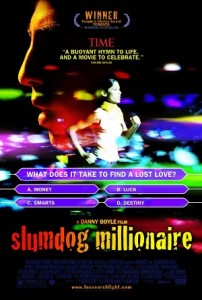 When you watch Danny Boyle’s latest rags-to-riches fairy tale “Slumdog Millionaire”, you’ll experience an emotional roller-coaster ride that only Mumbai can offer. The city that never sleeps, the city that is in the center of the center of the world (as mentioned by Salim in the movie), a city that has an economic and social contrast ratio of 20,000,000:1, reveals itself on the screen as Danny Boyle and his screen writer Simon Beaufoy (based on the novel Q&A by Vikas Swarup) masterfully crafts the film using the television game show “Kaun Banega Crorepati?” or “Who wants to be a Millionaire?” as the spine of the story. Indian slum and street life has been explored by many international film makers like Mira Nair (Salaam Bombay) and Roland Joffe (City of Joy) amongst others, but Slumdog brings to life the dark as well as the bright side of the city of Mumbai in a style that is shocking and heart warming at the same time. Continue reading
When you watch Danny Boyle’s latest rags-to-riches fairy tale “Slumdog Millionaire”, you’ll experience an emotional roller-coaster ride that only Mumbai can offer. The city that never sleeps, the city that is in the center of the center of the world (as mentioned by Salim in the movie), a city that has an economic and social contrast ratio of 20,000,000:1, reveals itself on the screen as Danny Boyle and his screen writer Simon Beaufoy (based on the novel Q&A by Vikas Swarup) masterfully crafts the film using the television game show “Kaun Banega Crorepati?” or “Who wants to be a Millionaire?” as the spine of the story. Indian slum and street life has been explored by many international film makers like Mira Nair (Salaam Bombay) and Roland Joffe (City of Joy) amongst others, but Slumdog brings to life the dark as well as the bright side of the city of Mumbai in a style that is shocking and heart warming at the same time. Continue reading
